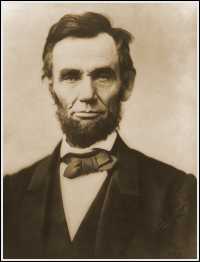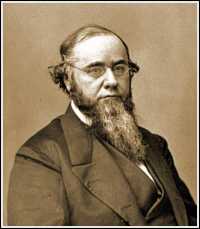Edwin McMasters Stanton (1814-1869)
Lincoln's Death
On the fateful morning of April 14, 1865, at the Paterson House on Tenth Street opposite the Ford's Theater while Lincoln lay dying of an assassin's bullet, Stanton plotted his revenge against the man who committed the crime. The city was put on full military alert. Secretary of State William Seward had been assaulted in his home, someone had attempted to assassinate Seward by stabbing him. Guards were placed at the homes of high government officials. 'It was a night of horrors', Salmon P. Chase wrote in his diary.
Stanton was credited with the quote 'he now belongs to the ages' upon the death of Lincoln.
Stanton was convinced the murder of Lincoln was part of a conspiracy , planned and set on foot by rebels under pretense of a avenging the rebel cause'. Abandoning his plans to retire, Stanton was in control of the government. The Army was under his control, the new President Andrew Johnson was unsure of himself and Congress was not in session.
Carrying on the business of still securing a peace, Lincoln's death was not far from Stanton's mind. He helped arranged the funeral details.
While Sherman and Stanton were feuding over what the attitude of the
government should be towards the conquered South and the rights that the
government should accord the Negro, government agents swept down upon the
Surratt
boardinghouse and arrest everyone in the place. Arrested for knocking
on the door of the boardinghouse while the Government troops were there was
Lewis Payne. Arrested on suspicion he proved to be the man who had
attacked Seward.
Also arrested later in other places were co-conspirators Samuel Arnold and
Michael O'Laughlin. George Atzerodt had failed to carry out his assignment
to assassinate Andrew Johnson, he was arrest as was Edmund Spangler a scene
changer at Ford Theater. Dr. Samuel Madd who treated John Wilkes Booth
broken leg.
Stanton ordered Payne, O'Laughlin Spangler and Atzerodt to be held below desk
on the monitor Montauk. The other men were held in the hold of the monitor
Saugus. Mrs. Surratt was held at the Carroll Annex of the Old Capital
Prison. The men prisoners all had an iron ball attached to his leg by a
heavy chair and wore handcuffs joined by an iron bar. Canvas bag hoods with
a hole cut in it for the men to eat and breathe, tied around his neck. They
were not allowed to see. Stanton promised to have the bags removed when
physicians attending the men complained the hoods might drive them insane.
Stanton also promised to allow the prisoners might have daily exercise and
reading material, but none of the Secretary of War's promises were ever
kept.
On April 20, Stanton offered a $50,000 reward for the capture of
John Wilkes Booth and an additional reward of $25,000 for the capture of
Herold and John Surratt.
Six days later on April 26, Stanton was
awakened with the news that Booth had been killed. Shot, contrary to orders,
in a burning barn by a cavalry officer Sergeant Boston Corbett. Herold was
also captured at the Port Conway Virginia barn. He accompanied Booth's body
back to Washington.
The body of the assassin was buried in a secret
unmarked grave beneath the floor of the Washington arsenal which at one time
served as a federal penitentiary.
President Andrew Johnson still
convinced that high-placed Confederate officials had been involved in the
plot offered a reward of $100,000 for the capture of Jefferson Davis.
 On June 30 1865, a military commission found all the prisoners guilty of
conspiring with the Confederates to murder Lincoln, Johnson, Seward and
Grant. Payne, Herold Atzerodt, and Mrs. Surrett were sentenced to hang They
were sentenced to be executed on July 7, 1865.. O'Laughlin, and Dr. Mudd
were sentenced to hard labor for life and Spangler received six years.
Stanton evaluated the new president as a man of vigorous physique and moral
courage. The man from Tennessee had dared defy the secessionist of his state
and spoke out for the Union. In 1868 things changed Stanton's opinion of
Johnson. Stanton's removal from the cabinet by Lincoln's successor Andrew
Johnson provided an opportunity for Stanton's Radical Republican
Congressional colleagues to impeach the President, whose Reconstruction
policies they had long opposed. Returning to private life he resumed his
private law practice and in the following elections he campaigned for Ulysses
S. Grant. Stanton pleaded with President Grant to pass over this sick
spoilist and asthmatic patriot", for a position on the Supreme Court bench.
On December 19 Stanton was confir.med as a Justice -President Ulysses Grant
appointed Stanton to the U.S. Supreme Court. Four days later before he could
assume his duties on the bench he died presumably from complications caused
by his lifelong asthmatic condition on Dec. 24, 1869. Hopefully he rests in
peace at the Oak Hill
Cemetery in Georgetown, just outside of Washington, D.C.
On June 30 1865, a military commission found all the prisoners guilty of
conspiring with the Confederates to murder Lincoln, Johnson, Seward and
Grant. Payne, Herold Atzerodt, and Mrs. Surrett were sentenced to hang They
were sentenced to be executed on July 7, 1865.. O'Laughlin, and Dr. Mudd
were sentenced to hard labor for life and Spangler received six years.
Stanton evaluated the new president as a man of vigorous physique and moral
courage. The man from Tennessee had dared defy the secessionist of his state
and spoke out for the Union. In 1868 things changed Stanton's opinion of
Johnson. Stanton's removal from the cabinet by Lincoln's successor Andrew
Johnson provided an opportunity for Stanton's Radical Republican
Congressional colleagues to impeach the President, whose Reconstruction
policies they had long opposed. Returning to private life he resumed his
private law practice and in the following elections he campaigned for Ulysses
S. Grant. Stanton pleaded with President Grant to pass over this sick
spoilist and asthmatic patriot", for a position on the Supreme Court bench.
On December 19 Stanton was confir.med as a Justice -President Ulysses Grant
appointed Stanton to the U.S. Supreme Court. Four days later before he could
assume his duties on the bench he died presumably from complications caused
by his lifelong asthmatic condition on Dec. 24, 1869. Hopefully he rests in
peace at the Oak Hill
Cemetery in Georgetown, just outside of Washington, D.C.
